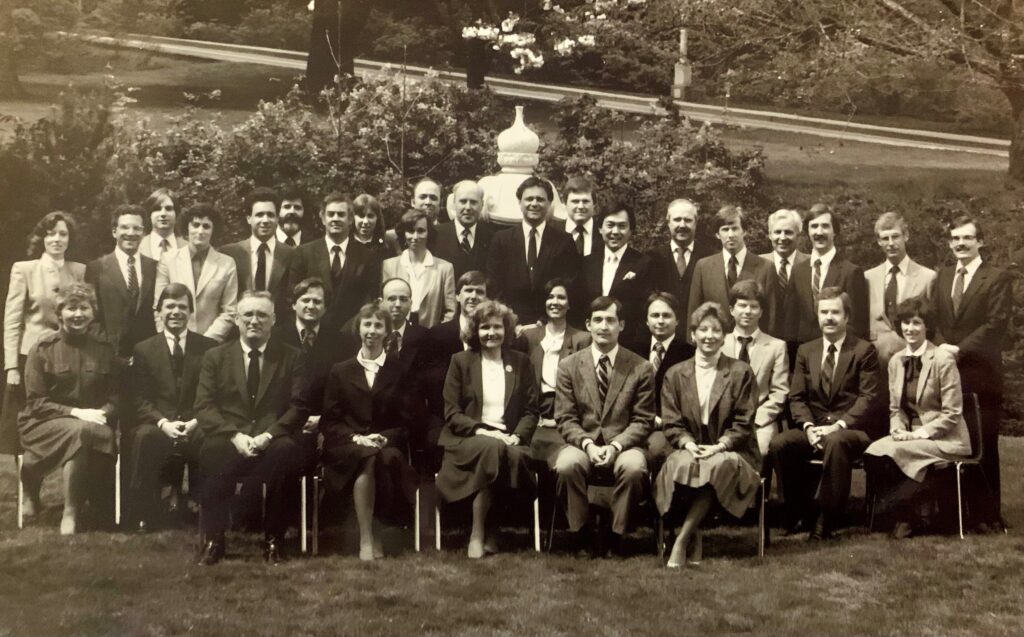
Executive MBA Program Turns 40
How the charter class of the Executive MBA program set the course for four decades of success.
The first cohort hadn’t even graduated, and already Business Week was ranking the University of Washington’s Executive MBA in the leading executive MBA programs in the nation.
Perhaps that was to be expected of the very first class of the Executive MBA, though. They were, after all, a high-flying bunch.
When the UW’s Executive MBA (EMBA) launched in 1983, it did so with 39 mid-career executives. Their average age was 39; they averaged 15 years of work experience each and nine years in management. While 85% came from the for-profit world, 15% came from nonprofit. Among them were already multiple advanced degrees—three Ph.D.s, two M.A.s, one M.D., and one J.D.
They came from a very robust and diverse set of industries—journalism; forestry; nuclear energy. And, of course, they came from the traditional industries one might think of attracting potential MBAs back then, too, like manufacturing and finance. Five from Boeing—although from different divisions or subsidiaries—at least three from banking, and a couple came from what was then the burgeoning field of software and technology.
What they had in common was a drive to succeed and a need to prove the experiment that was the UW’s Executive MBA program would work.
“They knew they were the first, they knew they were being watched, and they knew there was a lot on the line,” says Jan Monti, the first director of the Executive MBA Program. That, she says, was a lot of pressure; a lot of being under a microscope. But the class did perform. And 40 years later, the University of Washington Executive MBA program is still one of the top ranked Executive MBA (EMBA) programs in the U.S., ranking No. 2 in the Northwest and No. 27 nationally in 2024 by U.S. News & World Report.
They even had a class song, sung to the tune of the “Battle Hymn of the Republic.”
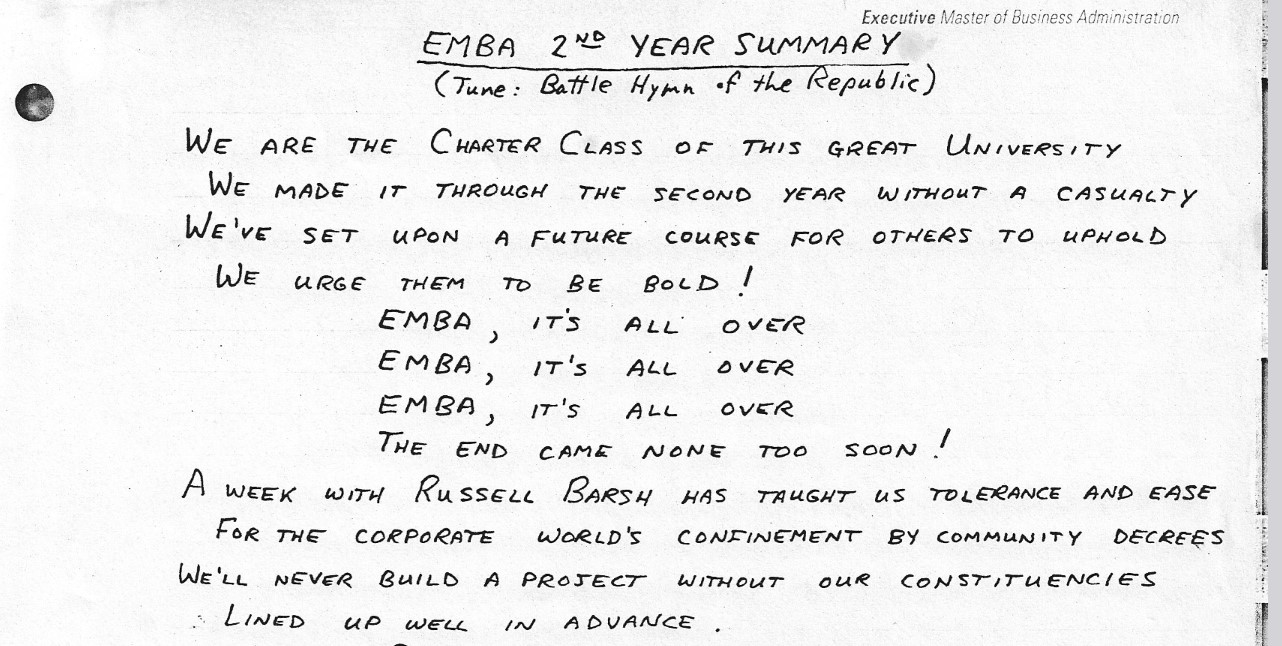
Brian Rohrback, president of Infometrix, Inc., was among that first class. He was working in the oil industry in Houston in the early 1980s when his mother sent him a newspaper clipping from the Seattle Times talking about a soon-to-launch executive MBA program and he thought, well, why not? He’d taken the GMAT on a lark after earning his Ph.D. in chemistry, so that hurdle was already cleared. And, he’d been thinking of starting a business of his own and knew that an MBA could help him get there.
He got in, but at the time he was still living in Texas, so for the first three months of the program, he commuted between Houston and Seattle in order to attend class. He especially connected with what he called the “commuter group” and they’ve stayed friends to this day.
“We had an amazing, very diverse collection of people that were in the program, that went on to do very successful things,” says Rohrback.
“We had everything from Boeing engineers, to accountants, to a treasurer of a bank. The Assistant Secretary of State for the state of Washington was in the program; we had a startup engineer for nuclear power plants. There was one Ph.D. English major who was working for REI, and there were people in the cohort running nonprofits. One guy was the head of the Northwest Center,” says Rohrback. And then, with a chuckle. “One of our classmates became the president of Boeing commercial airlines, you probably know about him? Scott Carson…”
For Rohrback, the Executive MBA wasn’t just a chance to rub shoulders with peers, it was a chance to gain five years of experience in a nutshell—a chance to learn about things that might happen in business without having to learn from firsthand experience.
“How do you deal with conflict with other customers, other companies? How do you deal with employees? How do you deal with financial stresses, with COVID happening and you can’t live in New York anymore…” Rohrback trails off, reflectively. “The program did really well in introducing techniques, evaluation, analytics, and other things that you can use to just be able to accommodate the unknown.”
While much of that might be things traditional MBA students right out of an undergraduate degree would learn, that learning seemed to have a bigger impact when the students had a bit more life experience, says Rohrback. “The difference is, you have different experience here. Your brain functions a little bit differently after you’ve been out and working in the world. So you understand things differently; you have a different perspective. I think that the impact is different even if the course material is the same. And I think it’s I think it’s better; I think it’s more impactful for someone who has had some business experience.”
It wasn’t just the faculty the class was learning from, says Rohrback, but also each other. “I learned a lot from my classmates. Being able to talk to them, seeing some of the things that they had been going through and have had to deal with in the past.” That, he thinks, is a big part of what made the EMBA, and especially that first cohort of it, so impactful.
That class had a character to it, too. Take a look at their first picture and everyone—male and female alike—is dressed in a suit. “No one dresses like that anymore,” says Rohrback.
Maybe what really marks the very first cohort of the EMBA program, however, was the caliber of people who were in it.
“Well, I’m prejudiced because I’m part of it, but I think it is a collection of some of the best people I’ve ever met. I do business all over the world; I get to meet a lot of people, I get to deal with people,” says Rohrback. The first class of the EMBA though, still stands apart. “Just, honest, straightforward, hardworking, just an impressive group of people. But nice. People that you would want to go sit down and have a beer with.”
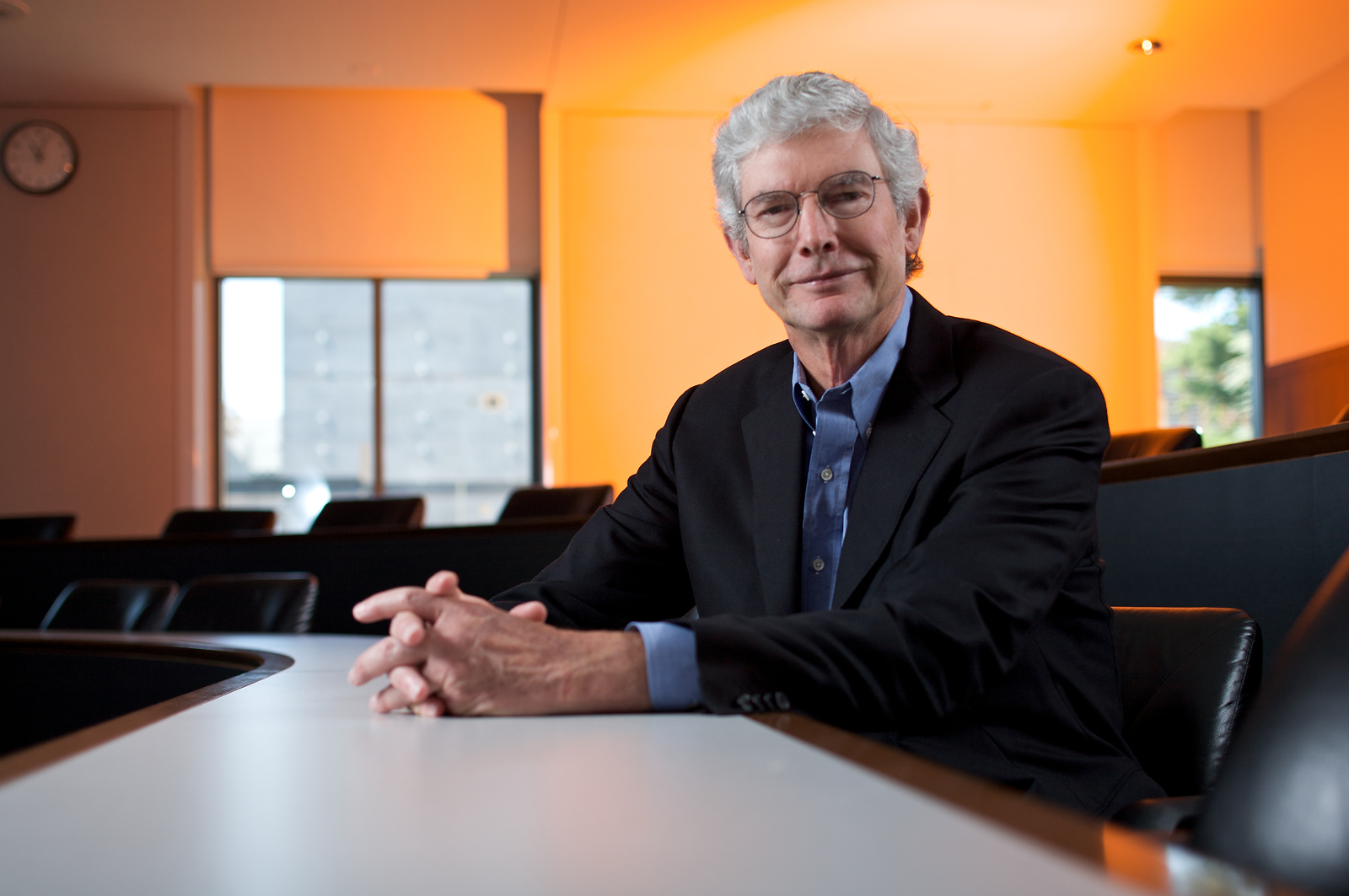 Professor Rocky Higgins
Professor Rocky Higgins The Start of Something Wholly New
Rocky Higgins, Emeritus Professor of Finance, was instrumental in starting the program. He chaired the committee that considered whether the UW School of Business wanted to take on an executive MBA, and then chaired the committee that designed the program.
“I was concerned that this program had academic substance to it. So, we designed a pretty demanding program,” says Higgins, “And students started coming to the program expecting to work hard and having to prove themselves.”
The first day of his class Higgins explained that in his class they’d be discussing a case, and that he’d be calling on one person, at random, each day to present their analysis of the case, with as much airtime as needed to explain their position. There was, he said, much nervousness about who would be called on first.
When that first day arrived and Higgins picked his victim, before they could even start their analysis another classmate jumped up, walked across the classroom, and handed the person who had been called on a fistful of $1 bills. It turns out, the entire class had taken a pool. The winner—or loser, as it might have been—got the windfall. And, of course, all the airtime they needed to present their analysis of the case.
The first class of the Executive MBA clearly had one another’s backs.
“The students formed a tight bond, and they went through a demanding experience, and as a result, became solid friends and good colleagues over their careers,” says Higgins of the first class of the EMBA.
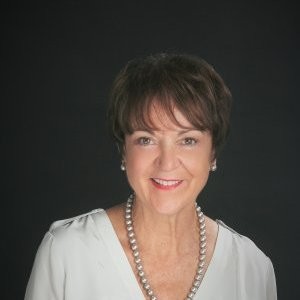
Jan Monti, who launched the program and served as its executive director for several years, has serious pride in the first class.
“They had a great sense of humor,” says Monti. “They had to. It was like boot camp, they were initiates into a new program.”
And, one that was being run differently than any other had at the UW to that point. When it launched, the Executive MBA was not state funded. It was private. “It was an entrepreneurial venture within the school, which had never been done,” said Monti. “It was a big experiment, and we had to make a profit. It was an interesting model for a school.”
The program was given seed money to get started and three years to pay it off. They paid the school back in less than two years.
“It was a successful business venture,” Monti says of the launch of the Executive MBA with a chuckle.
Virtually everyone flourished in the business world, with some rising to the very top of the business ranks. The class made an impact on the Pacific Northwest, too. Sure, there was Carson and Boeing and the fact that Washington State University’s business school is named after him, but that was just the tip of the iceberg.
“One of my classmates started a company called Chukar cherries,” says Rohrback. “I buy them and give them to people for Christmas presents.” That classmate didn’t just go on to launch his company after earning his MBA—J T Montgomery, ’85, started Chukar cherries with his wife, Pam, while he was in the program.There were others. Greg Whitten, MBA, ’85, who was the manager of the systems languages group at Microsoft when he joined the class, developed the standards for Microsoft’s BASIC compiler line. Sheila Vortman, ’69, ’85, retired from Puget Power as vice president of corporate services, served as the University of Washington Alumni Association president in 1993-’94; chaired the UWAA strategic planning committee in 1998-’99, and was named interim executive director of the UWAA in 2000. There was the journalist who left the newsroom to lead the business side—and enrolled in the EMBA—Mason Sizemore; the Director of Finance and Administration for the Seattle Symphony Orchestra, Laurie Elder and the Washington Assistant Secretary of State, Laura Eckhart.
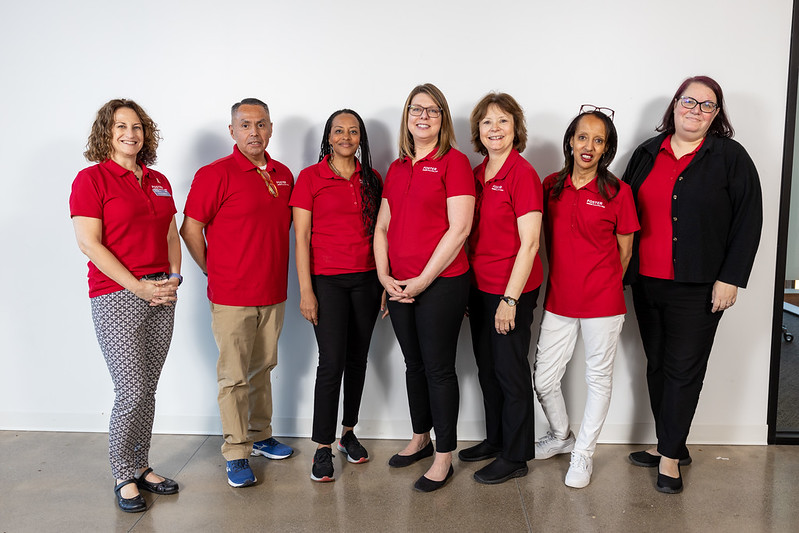
Forty years on, the UW Executive MBA program’s students, culture and impact continue going strong supported by team members: Louise Kapustka; Randell Hernandez; Belina Makonnen; Lisa Loucks; Michele Moore; Rahel Araya and Donna Sellers. Students worked as a class, learned from and taught each other, and created the program’s enduring culture: a tight-knit community, where students intersperse industry experiences and expertise with traditional MBA learning.
Maybe it was because they were first. Maybe it was because they’d placed a bet and won. Or maybe, it was those class songs.
Learn more about how the Foster School of Business Executive MBA program is continuing its tradition of excellence here.
